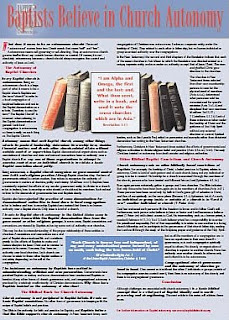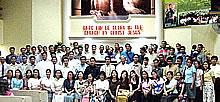The GBYO, youth arm of the Association of Grace Baptist Churches in Cavite, will hold a whole day seminar on “Choosing a career” today at Grace Baptist Church, GMA, Cavite. Speakers will be Atty. Gerry T. Galacio (morning session) and local DepEd officials (afternoon session). GBYO director is Ptr. Fermin Espino.
Saturday, April 10, 2010
Friday, April 02, 2010
Doctrine of Church Autonomy: secular courts and church disputes; how to prevent church splits
(Note: Jump to “Biblical, relational, and practical ways to prevent church splits”)
Baptist churches in the Philippines, just like in other parts of the world, have suffered splits. Over the years, I have counseled several pastors whose churches have been split. For examples, a pastor from a city east of Metro Manila had his church taken away from him by his best friend, the associate pastor, who spread lies and rumors against him. A young pastor from a province south of Metro Manila asked me for advice for over a year as to the brewing problems in his church. The Sunday after he expelled the rebellious officers and members of his church, the members loyal to him and the expelled members nearly had a violent conflict. I was told that, besides their Bibles, both sides in the conflict carried wooden clubs (“pamalo” in the vernacular).
My childhood church was split in 1981 and that event has been a defining moment in my life.
Church splits take place for a variety of reasons: a clash of personalities, theological or doctrinal grounds, financial mismanagement, immorality, etc. Some church splits have taken place over very trivial things like a piano bench that split the Holy Creek Baptist Church in 1999.
Church disputes are “intra-corporate disputes” under the jurisdiction of the Regional Trial Court; exceptions under the “Doctrine of Church Autonomy”
For Baptist churches in the Philippines registered with the Securities and Exchange Commission (SEC), church disputes are considered as “intra-corporate disputes” under the Securities Regulation Code. These disputes fall under the jurisdiction of the Regional Trial Court designated as a commercial court. You can read more about this and related issues in my posts:
- The Marian Guinn case: Improper use of church discipline
- Supreme Court ruling on termination or expulsion of church members
- SEC registration of churches
- Registering a local Baptist church with the SEC as a religious society or aggregate; what is a corporation sole?
- Sample Constitutions and by-laws which local churches can use instead of the SEC-issued forms
The US Supreme Court decision in “Watson v. Jones - 80 U.S. 679 (1871)” prescribed what has come to be known as “Doctrine of Church Autonomy”. The doctrine provides the exceptions when secular courts cannot interfere in church disputes. This landmark decision, promulgated nearly 150 years ago, has been cited by numerous decisions of US courts. Even the Philippine Supreme Court has cited the “Watson v. Jones” doctrine in the following cases: Fonacier vs. Court of Appeals, 96 Phil 417 (1955) and Taruc vs. Dela Cruz, GR No. 144801, March 10, 2005.
Briefly stated, the “Doctrine of Church Autonomy” says that secular courts should not interfere when the church dispute touches upon matters of faith, polity, discipline, canon law, or ecclesiastical relationships. L. Martin Nussbaum in his article “Watson v. Jones and the Doctrine of Church Autonomy” explains that this doctrine has caused courts to decline jurisdiction over six subject matters related to religious institutions, including:
1. Church splits and the resulting disputes over church property and ministry assignments, Kedroff, 344 U.S. 94 (1952);The decisions of the US Supreme Court cited above are applicable here in the Philippines because the freedom of religion clause of the US Constitution is the basis of the same clause in our 1935, 1973 and 1987 Constitutions. For example, the landmark decision of the Philippine Supreme Court on freedom of religion in the case of “Estrada vs. Escritor” is replete with citations from decisions of the US Supreme Court.
2. Disputes concerning the discipline of church members, O'Connor v. Diocese of Honolulu, 889 P.2d 261 (Hawaii 1994);
3. Disputes between ministers and churches, McClure v. The Salvation Army, 460 F.2d 553 (5th Cir. 1972) cert. denied 49 U.S. 896 (1972);
4. Claims arising from or related to church communications, United States v. Ballard, 322 U.S. 78 (1944), Klagsbrun v. Va'Ad Harabonim of Greater Monsey, 53 F.Supp.2d 732 (D.N.J. 1999); Parish of the Advent, 426 Mass. 268, 688 N.E.2d 923 (1997); and Bryce v. Episcopal Church in the Diocese of Colorado, (Case No. 00-1515) (10th Cir. 2002);
5. Claims against clergy for malpractice or breach of fiduciary duty, Nally v. Grace Community Church of the Valley, 47 Cal.3d 278, 253 Cal.Rptr. 97, 763 P.2d 948 (1988) cert. denied 490 U.S. 1007 (1989); and Schieffer v. Catholic Archdiocese of Omaha, 244 Neb. 715, 508 N.W.2d 907, 911 (Neb. 1993) (clergy malpractice recognized no where);
6. Claims against churches or church officials for negligent hiring, assignment, and supervision, Schmidt v. Bishop, 779 F.Supp. 321 (S.D.N.Y. 1991); Pritzlaff v. Archdiocese of Milwaukee, 533 N.W.2d 780 (Wis. 1995); Swanson v. Roman Catholic Bishop of Portland, 692 A.2d 441 (Me. 1997); and L.L.N. v. Clauder, 563 N.W.2d 434 (Wis. 1997)
Kinds of church property; church property disputes arising out of a split; majority rule in congregational churches
In Watson v. Jones, the US Supreme Court differentiated among three kinds of church property, namely:
“1. That first of these is when the property which is the subject of controversy has been, by the deed of will of the donor, or other instrument by which the property is held, by the express terms of the instrument devoted to the teaching, support or spread of some specific form of religious doctrine or belief.”The third class of church property involves those belonging to hierarchical churches. The US Supreme Court ruled that secular courts must defer to the church hierarchy.
“2. The second is when the property is held by a religious congregation which, by the nature of its organization, is strictly independent of other ecclesiastical associations, and so far as church government is concerned owns no fealty or obligation to any higher authority.”
“3. The third is where the religious congregation or ecclesiastical body holding the property is but a subordinate member of some general church organization in which there are superior ecclesiastical tribunals with a general and ultimate power of control more or less complete in some supreme judicatory over the whole membership of that general organization.”
The second class of church property mentioned above refers to those properties held by congregational churches (like Baptist churches). The US Supreme Court held that majority rule prevails in this situation. But in the case of “Jones v. Wolf 443 U.S. 595 (1979)”, the US Supreme Court, through Justice Blackmun, clarified that the “majority rule” will not prevail:
[1] If the identity of the local church can be determined by some other means, like the church charter or constitution; orAutonomy of local Baptist churches: a problem in resolving church conflicts
[2] If religious doctrine and polity will be involved when the secular court tries to determine who the majority is.
 The US Supreme Court in the cases I enumerated above has ruled that church conflicts involving doctrines, membership or property disputes anchored on doctrinal issues are beyond the jurisdiction of secular courts and should be resolved within the church itself. This is not a problem with hierarchical churches since they have a layer of officers or bodies that can resolve or mediate the conflicts in lower levels of the hierarchy. But what about Baptist churches which are independent of each other? One Biblical distinctive of Baptists is the autonomy of the local church.
The US Supreme Court in the cases I enumerated above has ruled that church conflicts involving doctrines, membership or property disputes anchored on doctrinal issues are beyond the jurisdiction of secular courts and should be resolved within the church itself. This is not a problem with hierarchical churches since they have a layer of officers or bodies that can resolve or mediate the conflicts in lower levels of the hierarchy. But what about Baptist churches which are independent of each other? One Biblical distinctive of Baptists is the autonomy of the local church. When the conflict involves a mission work, then the mother church can of course assert its authority. But when the conflict involves for example, two opposing groups within the church, they do not have a higher body to which they can ask for help to mediate or settle the problem. Regrettably, the remedy then for the contending parties becomes filing a petition with the Regional Trial Court to resolve an intra-corporate dispute.
I will write later on a post about how, with the consent of all the contending parties, a group of pastors or deacons chosen randomly like in the system used by the National Conciliation and Mediation Board (NCMB) can act as a body that will mediate, conciliate or arbitrate the conflict. This can possibly prevent the violation of the Biblical admonition about church members taking each other to court.
Biblical, relational, and practical ways of preventing church splits
 Thabiti Anyabwile is Senior Pastor of First Baptist Church of Grand Cayman in the Grand Cayman Islands and a Council member with The Gospel Coalition. He has written an excellent five-part series on how to prevent church splits. Posted below are the links to his series (Part I, Part II, Part III, Part IV, Part V) and the highlights:
Thabiti Anyabwile is Senior Pastor of First Baptist Church of Grand Cayman in the Grand Cayman Islands and a Council member with The Gospel Coalition. He has written an excellent five-part series on how to prevent church splits. Posted below are the links to his series (Part I, Part II, Part III, Part IV, Part V) and the highlights:How to prevent a church split, Part I
Early warning signs of a church split:How to prevent a church split, Part II
Growing numbers of cliques and factions
Low concern for the church
Self-interests dominate group interests
Isolated and absent members
Lack of humility
Mixed allegiance to the pastor(s)/elders
Low emphasis on the Word of God
“To prevent church splits, we must regain the centrality of the local church in our preaching and practice. We must lay heavy biblical emphasis on the centrality of the people of God throughout redemptive history and in contemporary Christian life. We must preach and emphasize the fact that the church is central to God’s affections, self-identification, and eternal plan. It must, therefore, be central to ours.”How to prevent a church split, Part III
The Church: The Center of God’s Affections
The Church: Central to Jesus’ Self-Identity
The Church: Central to God’s Plan of Redemption
“Every church split, by definition, involves people who are alienated in their affections toward one another. The splits occur when this alienation is hardened and seemingly intractable. But the roots of the split extend back to that time when everyone seemed to be getting along (meaning there were no obvious conflicts) but really didn’t know one another. That period is the calm before the storm. Introduce an offense, teach something that crosses someone’s pet sin or tender spot, and what appeared to be placid water begins to foam and roil until a major storm approaches the shores of the church.How to prevent a church split, Part IV
“As pastors I think it’s our duty to act while things are calm, to take a preventative step before these conditions for a split are aggravated. And, so far, I think one of the best antidotes to a split are wide, healthy, and spiritually encouraging relationships in the body.”
Hospitality
Discipleship
Modeling
Sentinels and Watchmen
A “daily dereliction” of the Word of God leads to the unraveling of the church. When, where and how does this “daily dereliction” occur?How to prevent a church split, Part V
Preaching
Counseling
Decision-making
Pastor’s Personal Life
“If we are to prevent church splits one thing we must do is make sure that the natural affections and authority that accrue to the teaching office is dispersed among the leadership of the church. We must find obvious, subtle, and effective ways to attach the allegiance of the people to the church and the leadership as a whole. Four things come to mind.”Ptr. Thabiti concludes his series with these wise and challenging words: “Pastors must lead. There is a danger of being overly passive in the face of situations and decisions that require clear thinking and charting a course. In those cases we must lead.” Later on he says that “pastors must not be afraid to lead the church toward a split in order to prevent a split”. This sounds wholly contrary to what his whole series is all about. But you have to read his concluding article in its entirety to understand what he means.
Teaching
Comments
Submission
Leading
To Ptr. Thabiti’s wise words, I can add my own caveat about church splits: “Do not ever be lulled into that complacent and overly-confident attitude that your church can never be split.”









